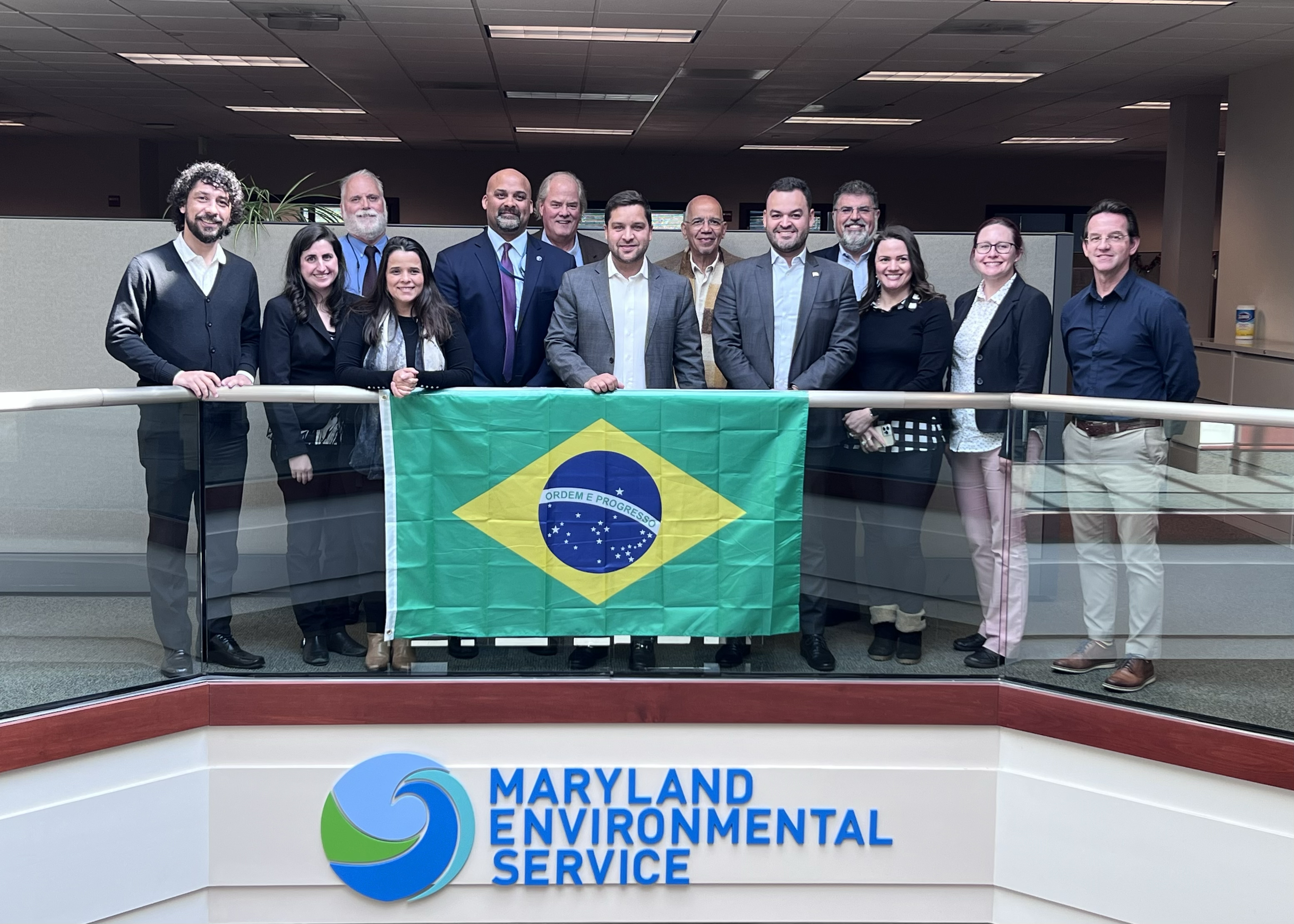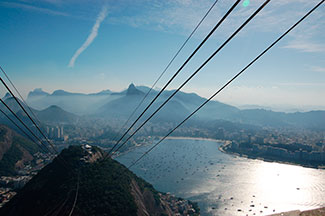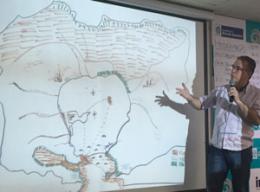Recent Engagements: 2023—
From March 20-21, 2023, a delegation from the State of Rio came to visit Maryland and continue with the partnership between Guanabara Bay and Chesapeake Bay.

Photos
Meeting Agenda
Partnership Meeting of Guanabara Bay and Chesapeake Bay
March 20-21, 2023
March 20, 2023
16:00 Depart Hotel – (Baltimore Marriott Waterfront, 700 Aliceanna St. Baltimore)
16:30-17:15 Welcome: Maryland Department of Environment
Secretary Serena McIlwain, Maryland Department of Environment
Deputy Secretary Suzanne Dorsey, Maryland Department of Environment
Depart for Tour and Dinner
Delegation Dinner (Rusty Scupper)
Visit Mr. Trash Wheel
Return to Hotel
March 21, 2023
08:30 Hotel Pick Up – (Baltimore Marriott Waterfront, 700 Aliceanna St. Baltimore)
09:00 Welcoming Remarks Maryland Environmental Service (259 Najoles Rd, Millersville)
Ellen Frketic (Executive Director or Deputy Director)
Dave Nemazie, Chief of Staff, University of Maryland Center for Environmental Science
Vice Governor Thiago Pampolha, State of Rio de Janeiro and Secretary of Environment and Sustainability
09:20-09:45 Intro to Chesapeake Bay
Dr. Bill Dennison, Vice President for Science Applications, UMCES
09:45-10:10 Intro to Rio
Ana Asti, Undersecretary of Water Security and Sustainability, Department of the Environment and Sustainability
10:10-10:25 Chesapeake Bay Governance - (Portuguese version)
Dr. Bob Summers, EcoLogix Group and UMCES
10:25-10:30 Short Break
10:30-11:00 Tour, Stormwater Best Management Practices (MES)
11:00-11:25 Innovative Waste Management
Tim Ford, Maryland Environmental Service
11:25-11:50 Legislative Engagement
Mark Hoffman, Chesapeake Bay Commission
Lunch and Welcoming Remarks Charles Glass, Executive Director, MES 101
13:00-13:25 Environmental Education
Adam Frederick, Maryland Sea Grant
13:25-13:50 Watershed Restoration Finance
Gabe Cohee, Chesapeake & Coastal Policy, Maryland Department of Natural Resources
13:50-14:15 Science Communication and Report Cards
Alexandra Fries, UMCES
14:15-14:35 Retrospective on Maryland’s BayStat
Dave Nemazie, UMCES
14:35-1500 Discussion
15:00-15:25 Local Government Sustainability
Bruna Attila, Office of Sustainability, City of Baltimore
15:30 Depart and Driving Tour
Previous Engagements: 2013—2017
Presentations and Reports Photos

The State of Maryland and the State of Rio de Janeiro have had a sister state relationship for several decades. In 2013, the Governors of both states reaffirmed this relationship with a specific goal of focusing on increasing the health of both the Chesapeake and Guanabara Bays. The Chesapeake Bay is the largest and one of the most productive estuaries in North America. However, with a very large watershed encompassing the cities of Baltimore and Washington, DC, including a high population, intensive agriculture, and extensive industry, the Bay's nutrient and sediment levels are too high which negatively effects water quality and fisheries. Guanabara Bay is highly impacted by a growing human population from several large cities (Rio de Janeiro, Niterói, and São Gonçalo), intensive urbanization, and industries, manifesting in very poor water quality and trash pollution, impacting fisheries and quality of life for local residents.

With funding by the Inter-American Development Bank, the State of Rio de Janeiro through PSAM has engaged in a Technical Cooperation with the University of Maryland Center for Environmental Science (UMCES) and KCI to exchange lessons learned and expertise while developing a status and restoration plan for Guanabara Bay.
UMCES Project
Through this technical cooperation, UMCES is supporting technical expert exchanges either in person or through webinars, developing a Guanabara Bay environment health report card, and coordinating a science to management conference between Guanabara and Chesapeake Bays. The initial focus of this program is to develop the environmental health report card for Guanabara Bay. Two stakeholder workshops have taken place to develop the framework of the report card and develop initial indicators of health (such as nitrogen & phosphorous concentrations, dissolved oxygen, bacteria among others). The stakeholder workshops have engaged over 50 individuals from dozens of organizations with tremendous expertise.
The Guanabara Bay Report Card
Environmental health report cards have been used successfully around the world to convey complex scientific information in a concise and simple format. A report card is a broad-level environmental assessment of a region. It is based on real data collected on carefully-chosen indicators, which makes it transparent and defendable. This can provide accountability as well as engage communities to learn more about their environment.
The Guanabara Bay report card will evaluate both the embayment as well as its basin. Thus far, two stakeholder workshops in April and June have occurred to begin creating the report card by following the five-step report card process. Learn more about the preliminary steps reached for the Guanabara Bay report card HERE.
KCI’s Project
The project that is being implemented by KCI for the Diagnostic of the Current Conditions of Guanabara Bay have the overarching objectives to identify, clearly explain and present to all stakeholders in the state of Rio de Janeiro:
1) The current environmental state of Guanabara Bay;
2) The main threats to the health of the bay; and,
3) An action plan with specific short-term goals to be achieved for the environmental recovery of the bay, and to demonstrate to all sectors of society that the necessary progress is being made on schedule.
These objectives will be achieved with the support of stakeholders and the incorporation of public comment at each stage of the project.
The first report produced for the project is the Diagnosis of Guanabara Bay, which discusses and explains the relevance of the experience of the Chesapeake Bay, in the State of Maryland, for the Restoration Plan of Guanabara Bay. The report also presents an overview of Guanabara Bay, through a summary of the existing information about the environmental conditions of the bay compiled from recent literature, including the following topics: general characteristics of the Guanabara Bay and its watershed, hydrodynamics of Guanabara Bay , Water Quality and metals in Guanabara Bay, Marine Biodiversity, Aquatic Habitat, land use in the bay’s Basin Region, the rivers of Guanabara Bay, solid waste, sanitation in the Basin, and the industries of Bay Guanabara. The section regarding the socio-economic aspects of the bay and its watershed has as main objective to highlight the most relevant characteristics for understanding the organization, socio-economic and territorial dynamics of Guanabara Bay, distinguishing gaps and issues that deserves special attention. The document addresses the issue of belonging and vulnerability of local residents and users of the bay and watershed, the conflicts between uses and users, and the local resident’s perception regarding the integration between the bay and watershed. The complete version of the report’s introduction can be found here.
The first Public Consultation Workshop for the presentation of the Diagnosis of the State of Guanabara Bay was held at the Museum of Tomorrow, in the city of Rio de Janeiro on 29 April 2016. About 180 participants attended the event, representing various sectors and institutions involved with the Guanabara Bay and its watershed. The comments from stakeholders present at the First Public Consultation Workshop were considered and incorporated into the diagnostic report delivered to the PSAM.
The presentation made by KCI in the workshop can be found here.

